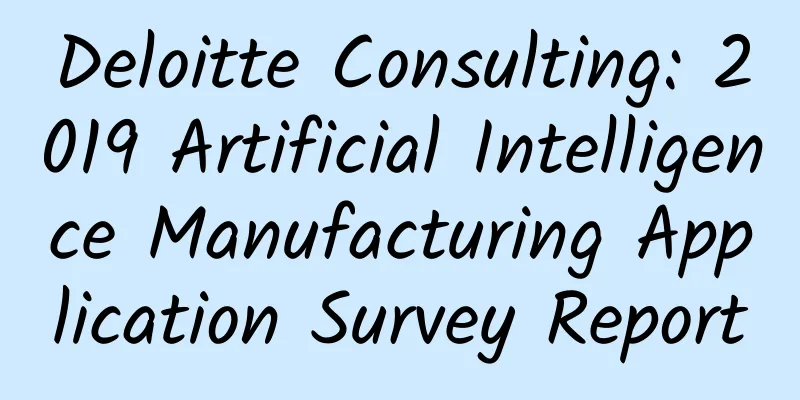Deloitte Consulting: 2019 Artificial Intelligence Manufacturing Application Survey Report

|
The application of artificial intelligence is expanding from consumer intelligence to enterprise intelligence, driving and creating stronger productivity. The manufacturing industry has a large amount of data accumulation, which is a blue ocean for the application of artificial intelligence. In 2019, artificial intelligence met the industrial Internet of Things at the edge computing layer, making it the first year for the implementation of artificial intelligence industry. The action of empowering manufacturing with artificial intelligence has been launched globally. The Asia-Pacific region has a strong manufacturing base and is a potential market for the application of artificial intelligence in the industrial field. This report aims to gain an in-depth understanding of the actual situation and application scenarios of artificial intelligence in Chinese manufacturing companies, explore the gap between the ideal and reality of artificial intelligence projects, and the future development trend of the industry. 1. Technology Trends In the past 100 years, five major trends have dominated the development of global technology, namely "electronic tools", "semiconductors", "enterprise services", "telecommunications" and "consumer intelligence". Today, the value created by the "Internet + consumer" model has been fully released and has become stable; and the sixth trend has emerged, which we call "enterprise intelligence". The intelligent transformation of enterprises to solve problems with digital technology is regarded as the future technology development trend. It is estimated that the manufacturing industry generates about 1,812PB of data each year, which is more than the communications, finance, retail and other industries. In the past two decades, the decision-making process of manufacturing companies has become complicated due to the massive growth of digital information. Companies are trying to effectively process and utilize information through intelligent technology, unlock the patterns and availability of data, and solve problems that were not even foreseeable before. The manufacturing industry has high hopes for artificial intelligence. According to the survey on artificial intelligence manufacturing applications, 93% of the surveyed companies agree that artificial intelligence will become a key technology for global manufacturing growth and innovation. China has performed outstandingly in the field of artificial intelligence applications. The market size of artificial intelligence in China's manufacturing industry is expected to exceed US$2 billion in 2025, and maintain an annual growth rate of more than 40% starting from 2019. The high growth of artificial intelligence applications in China's manufacturing industry is mainly driven by favorable policies, sufficient funds and the potential for manufacturing applications. 2. Application Scenarios There are many application scenarios of artificial intelligence in the manufacturing industry, which can be roughly divided into five areas: intelligent production, products and services, enterprise operation management, supply chain, and business model decision-making. Intelligent production-related application scenarios are currently the first choice for manufacturing companies to deploy artificial intelligence, followed by product and service-related scenarios. However, in the next two years, the hot application of artificial intelligence in the industrial field will shift from intelligent production to a greater focus on product services and supply chain management. In the field of intelligent production, currently the most widely used scenarios are automated production factories, order management, and automated scheduling; in the next two years, more artificial intelligence technologies will be used for product quality monitoring and defect management. The advancement of computer vision technology promotes the application of artificial intelligence in quality monitoring and defect management. In the field of products and services, there are currently few companies that are applying artificial intelligence technology, but the number of companies planning to prioritize deployment within two years has increased significantly, especially in application scenarios such as shortening product design cycles, personalizing customer experience, and improving marketing efficiency. 3. The gap between reality and expectations Through corporate surveys, we found that 91% of AI projects failed to meet corporate expectations, whether measured from the perspective of corporate benefits or from the perspective of budget and time investment. The large gap between AI project results and expectations is a common phenomenon around the world. This gap is often caused by the following issues:
4. The Future Is Here A Deloitte survey shows that 83% of companies believe that artificial intelligence has or will have a real and visible impact on their business in the next five years, of which 27% of respondents believe that artificial intelligence projects have already brought value to the company; 56% of respondents believe that artificial intelligence will bring returns to the company in the next 2-5 years. In terms of technology inclination, more companies will invest in complex technology systems to optimize production, cost, inventory or quality control, or for sales volume, price and predictive maintenance forecasts. The enthusiasm for investing in single technology categories, such as visual monitoring, robot positioning, expert systems, etc., is relatively low. The industry generally believes that industrial artificial intelligence platforms allow companies to apply artificial intelligence at a lower cost, which is a necessary condition for the implementation and popularization of artificial intelligence in the industrial field. 5. Deloitte recommendations China's manufacturing industry is on the eve of a large-scale explosion of AI applications, and leading companies have already begun to make plans to gain an advantage. Deloitte recommends that companies start with their own strategies, application scenarios, data foundation, team building, partners, verification and implementation to implement AI. 5.1 Strategic Goal Matching Companies first need to ensure that their AI deployments match their strategies and business goals. Whether the goal is to generate new revenue, reduce costs, or improve operational efficiency, the key is to choose the right level of complexity to meet the company's business goals. 5.2 Clarify application scenarios To find the right application scenarios for artificial intelligence, it is essentially necessary to understand in what aspects this technology can do better than humans. 5.3 Implementing the data foundation Since current deep learning-based artificial intelligence is highly dependent on big data, an enterprise’s data foundation is often the cornerstone that determines whether an AI project can be successfully implemented. 5.4 Team Building and Partnership Building If an enterprise wants to build AI capabilities, it needs a team consisting of at least the following types of talents: AI technology experts, industry experts, and AI application experts. 5.5 Validation and large-scale implementation After having an application scenario, improving the data foundation, and building a team, the next step is to verify the AI-based process design prototype (Proof of Concept). After confirming that the technical prototype is feasible, we will then iterate and eventually implement it on a large scale. The PDF version will be shared to the 199IT exchange group. If you want to support our development, please join us! |
>>: Chinese Academy of Sciences: White Paper on the Development of Artificial Intelligence in 2019
Recommend
The four major matrices of Tik Tok promotion and operation!
What are the ways to operate a matrix account? Ho...
2019 APP download rankings released: Douyin ranks second with over 700 million downloads
Recently, the data statistics company Sensor Towe...
Roasted oranges are good for relieving cough and reducing phlegm? Oranges are full of treasures
Science Fiction Network, December 20th: Recently,...
How to write a title? 7 steps, from conception to hit product
How did you come up with the title? Do you receiv...
Li Xiaoyue's Xiaohongshu full-level short video training camp, 30-day community training camp
Li Xiaoyue's Xiaohongshu full-level short vid...
Is the honey that can be drawn into a string real? After testing 11 types, I found that these identification methods have deceived me for many years
You may have heard of many methods to identify re...
Pop Mart's entire private domain operation system
The case analysis brought today is the disassembl...
Web Development Trends in 2015
[[126116]] The Web was originally conceived as a ...
2021 Postgraduate Entrance Examination English Vocabulary Solution [Postgraduate Entrance Examination] PDF electronic version Baidu Cloud Download
This book selects valid vocabulary from the Engli...
The latest practical skills to make money through Tik Tok live streaming!
In fact, it is very simple to judge whether a per...
He talks about 50 books a year and earns over 100 million yuan a year. Luo Zhenyu didn’t do it, so how can Fan Deng Reading Club do it?
The popularity of " knowledge payment "...
SEO trends in 2019: How to do SEO in 2019?
SEO trends in 2019: How to do SEO in 2019? I was ...
One hour of sun exposure and 10 kilometers of battery life: Lightyear-1's journey of technological innovation
Your browser does not support the video tag Autho...
"Yiwenzijue": The top ten buzzwords in 2023 released artificial intelligence big model, conspicuous bag, etc.
2023 is coming to an end. In the Internet era, a ...
Honda Fit GK5 facelift model debuts at Guangzhou Auto Show: civilian supercar becomes more sporty
If the most popular product of a car brand at an ...









